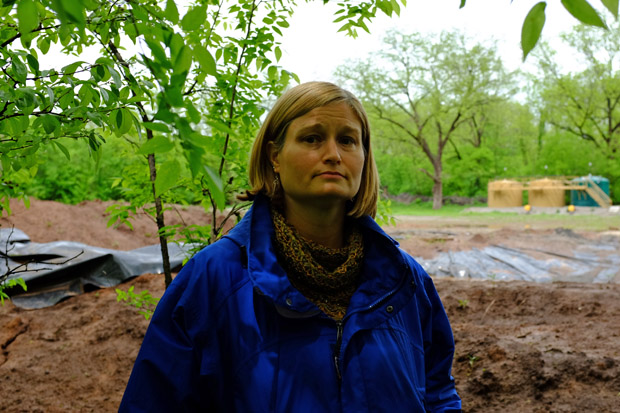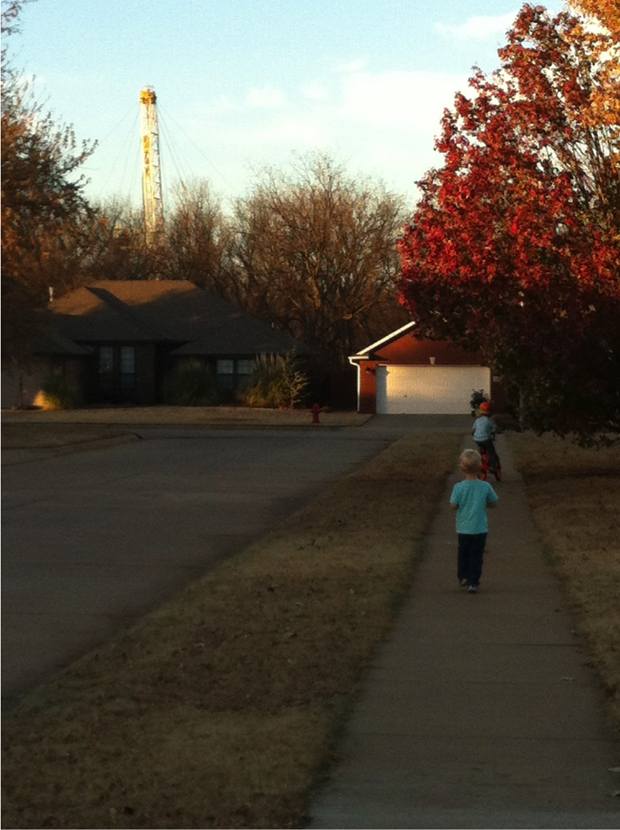
Stillwater resident Tammy Mix stands in front of an oil and gas well behind her house.
Joe Wertz / StateImpact Oklahoma


Stillwater resident Tammy Mix stands in front of an oil and gas well behind her house.
Joe Wertz / StateImpact Oklahoma

Joe Wertz / StateImpact Oklahoma
Stillwater resident Tammy Mix stands in front of an oil and gas well behind her house.
The Oklahoma House and Senate have advanced legislation to prevent cities, towns and counties from banning fracking and other oil and gas activities.
At least one of the bills will likely end up on the governor’s desk, but even in its unsigned, non-finalized form, the legislation is affecting local regulation.
Tammy Mix walks through the wooded area behind her house, in the Westpark neighborhood along the northwestern edge of Stillwater. Bugs buzz, birds chirp and dogs at neighboring houses bark.
“This is why we moved here,” Mix says. “In the spring, it’s beautiful here. It’s dense, there’s animals — it’s just a really nice place to be.”
When Tammy Mix bought her home 10 years ago, she had no idea she was moving her family to an oil field. She walks up to a muddy clearing and a bus-sized hole in the ground. Mix says she’s been told the pit could remain for more than a year until a pump jack and battery of oil storage tanks is installed.
This pit is temporary, but the drilling that occurred here in November 2014 is leaving a small, but permanent mark on oil industry politics in Oklahoma.
It started when Mix and her neighbors called the city and asked if anything could be done about the noise of banging equipment and whirring generators, the increased truck traffic and the blinding lights from the rig.

Tamara Mix
Tammy Mix's sons play on the sidewalk as a drilling rig peeks above the tree line behind her Stillwater home.
As calls from residents about the rig mounted, Stillwater officials started re-examining its municipal drilling code, which city attorney John Dorman says was written to manage small, vertically drilled wells, not the large horizontal drilling and fracking operations that are common today.
“Stillwater’s current oil and gas ordinances date back to the 1970s,” he says.
City officials started drafting new drilling rules, a rocky process that has attracted heated debate between residents, activists and energy industry representatives. One ordinance proposal included areas that required a setback of 1,800 feet between fracking sites and buildings like homes, churches and hospitals.
“That’s pretty excessive,” Dorman says. “That would be the widest separation in the country from our research.”
Dorman acknowledges some of the suggested setback requirements amount to an “effective ban” on some oil and gas activity, which helps explain why Stillwater has been getting so much attention at the state Capitol.
At least least eight bills were filed during the 2015 legislative session to limit the authority municipalities have over oil and gas activity within their city limits. The language of the legislation varies — and many of the bills are no longer active — but most were written to prevent officials in towns, counties and cities like Stillwater from banning — or effectively banning drilling and oil and gas activities like fracking.
Authors point to a voter-approved municipal ban on fracking in Denton, Texas, as the impetus for much of the Oklahoma legislation.
The oil industry, mineral owners and groups like the State Chamber support the legislation — state oil and gas regulators at the Corporation Commission, they say, have the expertise required to oversee a complicated and economically vital asset.
The Oklahoma Municipal League and officials in cities like Norman and Stillwater say it’s an overreach. In Oklahoma City, the City Manager’s office says it’s difficult to predict how its rules would be affected if the legislation becomes law.
The authors of two of the bills with the most momentum — House Speaker Jeff Hickman, R-Fairview, and Senate President Pro Tempore Brian Bingman, R-Sapulpa — say their legislation preserves municipal zoning authority over oil and gas activity, provided local ordinances are “reasonable.”
The question of what is considered “reasonable” has drawn criticism from city councilors, mayors and legislators at the state Capitol. During an April 22 debate on the House floor over Bingman’s Senate Bill 809, Democratic Rep. Brian Renegar wondered whether the bill would void the city of McAlester’s longtime ban on oil and gas exploration within its city limits.
“Is this bill going to completely wipe that out,” Renegar asked Hickman.
“Yes,” the House Speaker replied, the city would need to update its code with reasonable restrictions and eliminate its “blanket ban.”
Renegar followed up and asked Hickman to detail the terms of a “reasonable” city drilling ordinance.
“Anything that they think is necessary to protect the health, safety and welfare of the citizens of McAlester, but that doesn’t effectively prohibit or ban the operations,” Hickman said.
Dorman, the Stillwater attorney, is advising the mayor and city council that a new state law on drilling regulations could lead to costly lawsuits over city drilling ordinances. Part of the reason, says Dorman, is due to the lack of legal case law affirming new drilling laws and local ordinances.
“Because this will be a new statute, I have to tell them, ‘Well, there is some risk involved here, because someone could go and argue that your regulatory scheme is not reasonable in one respect or another,’” Dorman says.
Legislation to prevent local fracking bans has made its way through the House and Senate, including one measure, Senate Bill 468, that broadens the legal definition of an oil and gas taking — a government seizure of property for public use.
The 2015 legislative session is ongoing, but every capitol observer StateImpact interviewed expects some version of the anti-frack ban legislation to land on the governor’s desk. Dorman says the City of Stillwater is already operating as if it’s state law. Stillwater officials have delayed discussion on its drilling rules, in part, to see what becomes of the legislation, and are drafting a new, watered-down oil and gas ordinance.
From her kitchen, Stillwater resident Tammy Mix talks about her 4 and 6-year-old sons. She’s an environmental sociologist and professor at Oklahoma State University. She’s is worried about more than the nuisance of living near a drilling rig.
“We have significant body of literature that suggests that there are environmental health concerns related to people being in close proximity to these sites,” she says.
New city drilling rules won’t affect existing wells, like the one behind Mix’s home. And while the state legislation could limit oil and gas ordinances in cities and towns, it makes it easier for county governments to write them, which could give residents like Mix another local avenue to turn to when the drilling rigs move in.